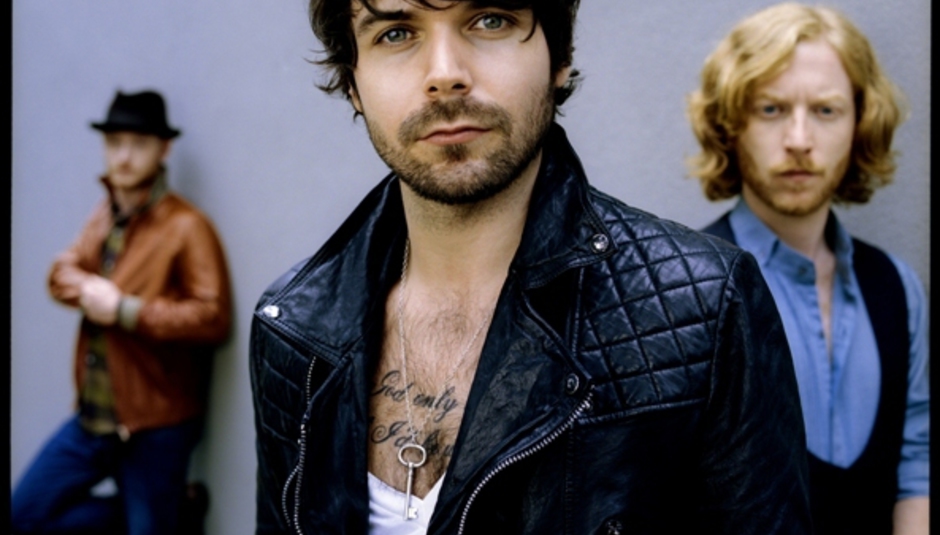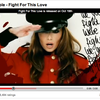A couple of weeks ago, DiS's Brad Barrett added to the anticipation/trepidation ahead of Biffy Clyro's impending fifth album Only Revolutions with a first listen piece in which he kind of sort of came to the conclusion that the once barking Scots trio had more or less gone proper mainstream, like. With just three weeks to go until the record's release, Neil Ashman caught up with bassist James Johnston to get the inside take on what looks to be their moment of crossover glory.
DiS: So Only Revolutions is your second album on a major label. Puzzle was a great commercial success. Does that mean you felt added pressure from the label to create another Puzzle or did that success earn you the right to a little more breathing space?
James Johnston: Interesting question... I mean there's always a lot of pressure from ourselves. We always want to make music that we're proud of and I guess that's the greatest pressure that we feel. Ultimately the label want us to do well for the our benefit and for theirs, so it's an interesting quandary, but the way we've always attacked it is to make the best music that we can make and that we want to listen to. Hopefully people are going to like it, I think we'd be lying if we said we didn't want people to like our record, but the best way to combat it is to make something we're proud of and try to ignore all the outside influences as best we can.
DiS: Opinion was divided on Puzzle, with some older fans perhaps finding it a little too accessible for their own tastes. How does Only Revolutions compare to it in that respect?
JJ: I think it's a great record, but a lot of people struggle because when you start liking a band, especially when we were a more underground band with our first three records, people start to take a little bit of ownership of the band and there's almost a part of you that likes them because nobody else likes them and they're your little secret. God knows we've felt the same way about bands in the past, so I understand it. I don't think these people are fucking crazy y'know, I understand their feelings, but I think we've made a great record and if people don't like it I feel sorry for them. I wish they'd like it! But I can't really comment on how I feel people are going to enjoy this record, because music is such a personal thing and it's really impossible to say what other people are going to think.
DiS: ...So you're not really concerned with having to appease those sort of fans?
JJ: Yeah, well I don't want to sound ungrateful or say that the people who buy our records and listen to our music aren't important. I mean we wouldn't be where we are without the kids coming to our shows and all those things, but it doesn't do yourself any favours if you start worrying about them, because you start second guessing every move you make.
DiS: ...And of course it's a good thing in that it shows you have a fanatical fanbase...
JJ: Absolutely, it's a nice thing when people say they hate you, because at least at some point they loved you. Hah.
DiS: The album's title is taken from the 2006 novel by Mark Z. Danielewski. In what way did it inspire or suit the album as a title?
JJ: It's a really interesting book, even the form that the book takes: it's one story told from two peoples' perspectives and you read eight pages from one side of the book and then flip the book over and read eight pages from the other person's story. The first page has got three quarters the right way round and then bottom quarter is upside down so you kind of read the two stories concurrently until you get... you're always reading the... it's such a complicated thing to explain! But that's the kind of way it works. The nice thing is that it's a story told from two points of view and Simon got married last year and I think it's a love record in that regard, it's about his relationship with his new wife. A lot of it is about trying to take arguments from somebody else point of view and be able to see two sides of the picture. I guess a lot of it is about the revolutions in life and revolutions in relationships and those sort of things, just the stuff everyone goes through at different points in their life.
DiS: You're not expecting people to listen to the first track then skip to the last track and do it that way though, are you?
JJ: No, haha, but that would have been interesting, we should have thought about that.
DiS: One of things the new record does share with Puzzle is its producer, Garth Richardson. Was he just a natural choice or did you feel there were particular qualities he brought to Puzzle which would benefit the new songs?
JJ: It wasn't as direct as that. We're lucky to work with somebody like Garth who is right at the top of his game and he's there to encourage the band and get great sounds. We always try to work really hard on the songs at home so that all that's taken care of, so we're not in the studio and kind of busking it. We just got a great relationship with Garth eventually, I mean it was tough at the start of Puzzle trying to figure out how he worked and for him to figure out how we worked. We got it all worked out and the communication was there basically.
Video: Biffy Clyro: 'Mountains'
DiS: 'Mountains' is included on the album. Was this always the plan or was it originally planned as a stand-alone single?
JJ: We weren't too sure. We were starting to write for the new record and 'Mountains' was ready and we had a whole bunch of festivals coming up, so we just felt that it was time we had a new song to play to keep ourselves interested and also for the people coming to see us. I think it worked out well. The reason we decided to put it on the record was that we felt that in maybe five or ten years time if the song wasn't on the record then it would get lost. People might have been like "What's this song? I didn't have that single" or something like that. It was maybe just too good a song to leave out. I think it definitely fits on the record and adds a lot to the record as well.
DiS: So Josh Homme makes an appearance on the album, playing a guitar solo on 'Bubbles'. How did that come about?
JJ: We did some tours with the Queens in Europe and in the States and we got on really well. We shared a love of music and learned a lot from the way those guys work and operate. He heard we were going to be going to LA and said to give him a shout. I don't think he expected us to, but of course we did and he was gracious enough to come down, 'cos he's a very busy guy. He just came down, plugged in his guitar and, I think he listened to the song one time through and just went into the studio and started doing his thing. We definitely want to stay away from raving about the fact we have someone famous on our record, that really wasn't too important to us. What was cool was that he added a lot to the song and I think it really stands out.
DiS: You seem to have become the go-to-guys for support at stadium and arena gigs. You've done The Who, Rolling Stones and Bon Jovi...
JJ: That's right yeah, the proverbial support band. I don't know why that is. If you told us ten years ago that we would get a chance to do any of those shows we would have told you that you were crazy. Nobody goes to a Bon Jovi show to see the support band and we were quite aware of that. It's just really good experience playing on a big stage like that to 20,000 people who really don't want to see you. It definitely brings something out of you. We've always been the underdog as a band and that kind of reminds of how much you've got to fight.
DiS: Did you get to meet them all?
JJ: We got to meet the Stones. We had a little photo-call which was quite funny: there was a million people buzzing around, and they puts us in a corridor to wait for them and took our drinks off us in case we spilled our drinks on them.
DiS: Really!?
JJ: Yeah it was really surprising, but then they were all wearing sequined jackets and shit, and probably Armani suits or whatever. But on the whole we haven't really met anyone at that level that's a dick and maybe you don't get to that level if you are. If you go about being an arsehole to people, who wants to know about it? Generally people are really sound.
DiS: So does playing support slots at gigs that size give you a greater hunger to do bigger shows of your own?
JJ: It does actually yeah. There's a lot to be said about losing intimacy at a gig and the bigger it gets the more difficult. Where we come from people have a lot to say about the SECC, but we played there last December and it felt like one of our great shows at the Barrowlands. There was maybe two or three times as many people there, but it was great bloody fun. As long as you can get people united in a room and singing from the same hymn sheet then it doesn't matter where you are. So we enjoy the challenge and it's very exciting. We'll not stop doing small shows where you can see the whites of people's eyes, but it's great fun to be on a great bloody stage.
DiS: Has it given you any ideas for lighting etc for your own tour?
JJ: Yeah, we're going to have some big lights, some retina burners. We're lucky enough now, as was our dream years ago, to have someone to come do our lights and have our own soundman and all those things, so we're trying to make the most of that. It's a really visual thing going to a gig and it's about all the different facets of the performance, so it great to have lights to support you.
DiS: Any intention of including the pirate costumes from the video for 'The Captain'?
JJ: It's a secret ambition of mine, but I would never say that to the guys. I think costume changes we'll save for next year. The only change we'll make is, when it gets too hot, take our tops off.
Video: Biffy Clyro: 'That Golden Rule'
DiS: You have upcoming support dates with Muse, do you perhaps see parallels between yourself and them, in that you're both British rock bands that have achieved a significant degree of commercial success without belonging to any prevailing trends or fashions?
JJ: Yeah, I think that's the parallel right there: three-piece rock bands from wee towns that have just done their thing. I guess we've both made music that's unfashionable in some regard, but managed to not pay any respect to that and just do our thing. Obviously Muse are a much bigger band than us and in that regard a band we look up to. They're an incredible band live and all such amazing players. We'll learn a lot from getting to see how they do it every single night. We love what we do and want to do it for years so if we can nick a few tricks off guys like this I think we're on to a good thing.
DiS: You played a few festivals this summer. Did you get a good chance to see how the crowd reaction has been to the new material?
JJ: We played Rockness, where I think the only new song we played was 'Mountains' and I guess people had heard that on the radio. Then we played V-Festival which isn't really a typical Biffy crowd. I think last time we played V everyone was standing with blank expressions wondering why we were shouting at them in the sunshine, but this time round there seemed to be more recognition and people seemed to know the songs. So we flung a couple of new ones in and had a great reaction. We've always enjoyed playing new songs live and don't shy away from it. If we could play the whole album live we would, but we need to wait for more people to hear the record. It was funny going to V and noticing a marked difference from previous years.
DiS: Do you feel vindicated by the fact you've reached the stage where you can play festivals and support slots to crowds of thousands where people aren't there specifically to see you, yet they will at least know some of your songs?
JJ: I don't know. I think if I was to say 'yes' it might seem like I'm patting myself on the back. Like I said earlier we like being the underdog and we really do, we love it when you go out there and maybe nobody has a clue who you are. Maybe if things continue the way they are it will change a little. Maybe that will give us less to prove, but I hope not because it is really important for us to feel we have something to prove as a band.
DiS: Looking at the broad spectrum of bands you played with, this is also reflected in your fanbase. It seems like you are as likely to share fans with a band like the Arctic Monkeys as you are with Slipknot...
JJ: Yeah, but we don't want to be the everyman band. We've always said we'd rather be a one person's favourite band than a hundred people's tenth favourite band. We don't want to water down our music so that everybody can quite like it, but if people like our music then that's fine, we wouldn't want people to not like our music. We wouldn't work this hard if that was the case.
DiS: You're taking the Manchester Orchestra and Pulled Apart By Horses on tour with you. Do you have a say in the choice of support?
JJ: Yeah, big time. Sometimes you're doing friends a favour, but more often than not it's just a case of trying to get a really great band. Manchester Orchestra are a really amazing band, just great songs and Pulled Apart By Horses are a really wacked out band, really quite crazy and I've not actually seen them live, so it's cool to be able to discover them every night. I remember when I was younger I thought you wouldn't want too good a support band in case it makes you look bad, but that's really wrong. You want to get the best band you can so you have to try double as hard, and they keep you on your toes.
DiS: So you're busy up until the end of the year. What are your plans for next year?
JJ: We're playing a gig in New Zealand on Hogmanay, or maybe it's a Australia, Brisbane or somewhere like that. Next Year Manchester Orchestra are going to return us the favour and takes us out in the States and we'll be touring more around Europe than the States and we'll be back in the UK for the festivals. Another full calendar next year, just the way we like it.






















